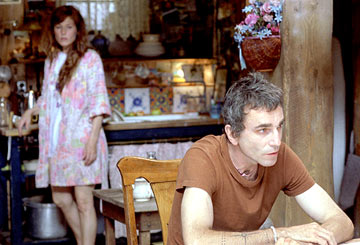

The new world clashes with the old in Rebecca Miller's The Ballad of Jack and Rose, a sometimes moving and sometimes frustratingly obtuse story. Jack (Daniel Day-Lewis, Gangs of New York, The Boxer) and his daughter Rose (Camilla Belle, Back to the Secret Garden, The Invisible Circus) live on an old hippie commune on an island somewhere off the east coast of America. Jack is independently wealthy, and fierce in his beliefs about self-sustenance and harmony with nature. Jack and Rose grow their own food, produce their own electricity, compost, and earn extra money by selling flowers.
Life in this idyllic world cannot last forever. Jack is battling developer Marty Rance (Beau Bridges, Boys Klub, Sordid Lives), who wants to add subdivisions to the island. Jack vehemently opposes this, vandalizing new homes and claiming the island is a wetland. Jack is also sick, and realizing that life for he and Rose is about to change profoundly. He has been seeing Kathleen (Catherine Keener, S1m0ne, Full Frontal) and asks her to live on the island with him. She brings along her two sons Thadius (Paul Dano, Taking Lives, The Girl Next Door) and Rodney (Ryan McDonald, Halloween: Resurrection).
Rose is not used to being around people constantly, and reacts in a very negative manner. She sees Kathleen as a sort of usurper, and resents the fact that Jack thinks he needs to go to others for help. In a sense, Rose is pretty psychotic. She tries to undermine Kathleen at nearly every opportunity, and lashes out at Jack in the process. Like every movie he is in, Day-Lewis remains at the emotional center. Jack knows he is dying, and is trying to reconcile all aspects of his life. He believes he raised Rose properly, but when Kathleen informs him otherwise, it is like a punch to the gut. It forces him to reevaluate the ways he lives and thinks, in order to determine what is best for Rose. Belle is able to hold her own against Day-Lewis, but her character is much thinner and seems to almost be just a construction.
Writer/director Rebecca Miller (Personal Velocity, Angela) never seems quite able to fully integrate the story of Jack's rude awakening with Rose's emerging womanhood and rebellion. Rose's reactions are understandable, but a bit overplayed, nearly to the point of unintentional humor. Everything feels a bit too artificial, as if these are characters in a film and not part of an organic story. Miller does do a good job with the dialogue, much of it biting and witty between father and daughter, but although it is enjoyable, it still feels constructed.